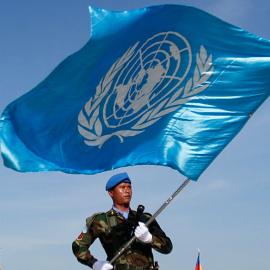To the Editor:
One need not be an unreserved defender of the present U.N. system to be mystified by Max Boot's review essay of William Shawcross' new book, Deliver Us From Evil ("Paving the Road to Hell," March/April 2000). He appears to believe that American "benevolent global hegemony" and "liberal imperialism" based on U.S. power are "alternatives to the United Nations." Boot claims that U.N. peacekeeping has failed because "the U.N.'s culture breeds conciliators," and that its efforts to use force are "pathetic." But he sees no good reason (perhaps not knowing the U.N. Charter) why "great powers [should] limit their freedom of action É over their military interventions" by committing more muscle to the U.N. At the same time, he concedes that narrow realpolitik is not enough; that in the modern world, ethnic cleansing must be curtailed; and that humanitarian intervention is sometimes unavoidable. But "wherever possible, the United States should encourage its allies to act without American involvement" because "no nation, no matter how rich, can afford to wage war without end."
On these premises, one would expect greater support for America's newly democratic friends (whom Boot welcomes) in Asia, Latin America, and Europe when they volunteer for collective military action to help keep the peace under the rules of the U.N. Charter -- which was written largely by the United States. Where "the United States may have to make the heartbreaking choice to stay out" (e.g., in Rwanda, although not in Haiti), what about at least giving more consistent political support for the U.N. peacekeeping budget (still hugely in arrears) to help pay for the "Bangladeshis, Bulgarians, Brazilians, and the like" who put their lives on the line and whom Boot so insultingly dismisses? Where a U.N. force as such is not the choice, Security Council authority for regional or coalition action at least underwrites legitimacy. So even with Boot's minimalist definition of the U.N. as "an occasionally useful adjunct to great-power diplomacy," a modicum of respect for multilateral endeavors by others is plain common sense. Nato, even under the new strategy, cannot and should not do everything. That is why all the NATO allies and Japan, as well as major regional players, do their bit for the U.N.
JOHN WESTON
U.K. Ambassador to NATO, 1992-95, and U.K. Permanent Representative to the U.N., 1995-98
